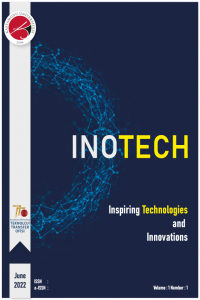Recent Developments with Biosensors in the Diagnosis of Cancer Diseases
Recent Developments with Biosensors in the Diagnosis of Cancer Diseases
Biosensor, early diagnosis cancer disease.,
___
- 1. Acar H, Özer N: The implication of molecular markers in the early stage diagnosis of colorectal cancers and precancerous lesion. Turkish j Biochemistry 2022; https://doi.org/10.1515/tjb-2022-0052.
- 2. Acar H, Özer N: Are serum moleculer markers more effective than the invasive methods used in the diagnosis of breast cancers? Turkish j Biochemistry 2021; https://doi.org/10.1515/tjb-2021-0001.
- 3. Acar H, Özer N: What is the Impact of Serum Molecular Markers on the Diagnosis of Thyroid Cancers? A Comparison of Serum Molecular Markers with Invasive Biopsy Methods. Asian Journal of Research and Reports in Endocrinology.2021;4(2):32-41.
- 4. Acar H, Özer N: What is the effect of advanced diagnostic methods on sensitivity and survival in the multiple breast cancers? A systematic analysis and comparison. Asian Journal of Medical Sciences.2021:12(7).
- 5. Kaura B, Kumar S, Kaushika BK: Recent advancements in optical biosensors for cancer detection. Biosensors and Bioelectronics.2021;197(1).
- 6. Alharthi SD, Bijukumar D, Prasad S, Khan AM, Mathew MT: Evolution in Biosensors for Cancers Biomarkers Detection: A Review. Journal of Bio-and Tribo-Corrosion.2021;7(42).
- 7. Kholoud KA, Alaa I, Reem Mergawy: Advances in Cancer Diagnosis: Bio-Electrochemical and Biophysical Characterizations of Cancer Cells. Micromachines. 2022;13(9).
- 8. Shahdeo D, Gandhi S: Biosensor Based Advanced Cancer Diagnostics From Lab to Clinics.Biosensor Based Advanced Cancer Diagnostics.2022; https://doi.org/10.1016/B978-0-12-823424-2.00016-8.
- 9. Zhang Y, Lyu H: Application of biosensors based on nanomaterials in cancer cell detection. Journal of Physics: Conference Series.2021;Vol 1948.(IoTAIMA 2021),Hangzhou, China.
- 10. Kaya I, Özçelikay G, Mollarasoulic F, Bakırhan NK, Ozkan SA: Recent achievements and challenges on nanomaterial based electrochemical biosensors for the detection of colon and lung cancer biomarkers. Sensors and Actuators B: Chemical.2022;351:130856.
- 11. Pereira C, Parolo C, Idili A, Gomis RR, Rodrigues L, Sales G et al: Paper-based biosensors for cancer diagnostics. Trends in Chemistry.2022;4(6).
- 12. Zhanga S, Ronga F, Guoa C, Duona F, Hea L, Wanga M,et al: Metal–organic frameworks (MOFs) based electrochemical biosensors for early cancer diagnosis in vitro. Coordination Chemistry Reviews.2021:439.213948.
- 13. Sharifianjazi F, Rad AJ, Bakhtiari A, Niazvand F, Esmaeilkhanian A, Bazli L, et al: Biosensors and nanotechnology for cancer diagnosis (lung and bronchus, breast, prostate, and colon): a systematic review. Biomedical Materials.2021;17(1).
- 14. Sharmaa A, Dultaa K, Nagraika R, Dua K, Singh SK, Chellappand CK, et al: Potentialities of aptasensors in cancer diagnosis. Materials Letters.2022;308:131240.
- 15. Munoz-San M, Pedrero M, Gamella M, Montero-Calle A,Barderas R, et al: A novel peptide-based electrochemical biosensor fort he determination af a metastasis-linked protease in pancreatic cancer cells. Anal. Bioanal. Chem. 2020;412:6177-6188.
- 16. Lu X, Yao C, Sun L, Li Z: Plasmon-enhanced biosensors for microRNA analysis and cancer diagnosis. Biosensors and bioelectronics.2022;203:114041.
- 17. Chen M, Wu D, Tu S, Yang C, Chen DJ, Xu Y: A novel biosensor for the ultrasensitive detection of the lncRNA biomarker MALAT1 in non-small cell lung cancer. Nature Scientific Reports.2021;11:3666.
- 18. Syed HH, Cesar SH, Arnan M, Anne-Laure D, Laurenceay E: Biosensors for circulating tumor cells (CTCs)-biomarker detection in lung and prostate cancer: Trends and prospects. Biosensors and Bioelectronics.2022;197:113770.
- 19. Boriachek K, Umer M, Islam N, Gopalan V, Lam AK, Nguyen NT, et al: An amplification-free electrochemical detection of exosomal miRNA-21 in serum samples. Analyst.2018;143(7).
- 20. Arshad F, Nabi F, Iqbal S, Khan RH: Applications of graphene-based electrochemical and optical biosensors in early detection of cancer biomarkers. Colloids and Surfaces B: Biointerfaces.2022;212:112356.
- 21. Iannazzo D, Espro C, Celesti C, Ferlazzo A, Neri G: Smart Biosensors for Cancer Diagnosis Based on Graphene Quantum Dots. Cancers.2021;13(13).
- 22. Mostufa S, Akib TBA, Rana M, Islam R: Highly Sensitive TiO2/Au/Graphene Layer-Based Surface Plasmon Resonance Biosensor for Cancer Detection. Biosensors.2022;12(8). 23. Kshirsagar P, Seshacharyulu P, Muniyan S, Rachagani S, Smith LM, Thompson C, et al: DNA-gold nanoprobe-based integrated biosensing technology for non-invasive liquid biopsy of serum miRNA: A new frontier in prostate cancer diagnosis. Nanomedicine: Nanotechnology, Biology and Medicine.2022;43:102566.
- 24. Baabuc S, Srinivasanad S, Nagarajan S, Muthamilselvana S, Selvia T, Sureshb RR, et al: End-to-end computational approach to the design of RNA biosensors for detecting miRNA biomarkers of cervical cancer. Synthetic and Systems Biotechnology.2022;7(2).
- 25. Uygun ZO, Yeniay L, Sağın FG: CRISPR-dCas9 powered impedimetric biosensor for label-free detection of circulating tumor DNAs. Analytica Chimica Acta.2020;1121:35-41.
- Yayın Aralığı: Yılda 2 Sayı
- Başlangıç: 2021
- Yayıncı: Kastamonu Üniversitesi
Recent Developments with Biosensors in the Diagnosis of Cancer Diseases
Provenance of Kinet Höyük Ceramics Uncovered in Excavations: Petrography, XRF and Raman Analysis
Murat EROĞLU, Kıymet DENİZ, Yusuf Kağan KADIOĞLU, Marie-henriette GATES
Goksal GUNERHAN, Emin ÇAĞIL, Denizhan DİVANLIOĞLU, Özhan Merzuk UÇKUN, Murat KORKMAZ, Ali DALGIÇ, Ahmet Deniz BELEN
Daily Digital Currency Values Estimation Using Artificial Intelligence Techniques
Ahmet TABANLIOĞLU, Abdülkadir GÜMÜŞÇÜ
Evaluation the Knowledge and Radiation Protection of Radiation Workers at Ibensina Hospital
Yosef G. Ali MADEE, Rezvan REZAEİZADEH, Aybaba HANÇERLİOĞULLARI
